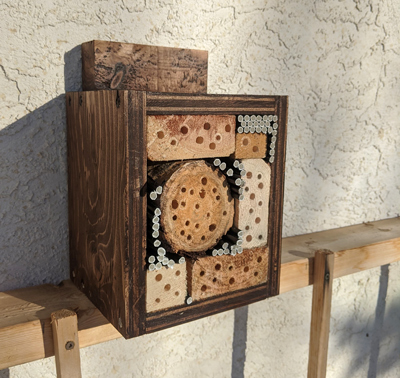Bee hotels provide temporary refuge for solitary bees
The buzzing success of a student club’s recent fundraiser didn’t just bring in money for the group – it also created dozens of new homes for vulnerable insects on the move.
Every year, NAIT’s biological sciences club puts on fundraisers to raise money for things like conference tickets for its members, training and certification, and costs of graduation events. This time around, however, they decided to try something different: making and selling bee hotels.
“We wanted to do something a little more unique, and aligned with the values of the Biological Sciences [Technology] students,” says Celina Gerlich, the club’s president and a conservation biology student. “A lot of us support conservation initiatives, and it’s the foundation of our program.”
 “We wanted to do something a little more unique, and aligned with the values of the Biological Sciences students.”
“We wanted to do something a little more unique, and aligned with the values of the Biological Sciences students.”
With the help of a grant from the NAIT Students’ Association, Gerlich and her clubmates were able to purchase supplies and assemble 53 bee hotels. The wooden boxes are roughly the size of a loaf of bread and are stuffed full of paper straws and wooden blocks with different-sized holes. They’re designed to give solitary bees a place to safely nest and lay their eggs.
The club announced their new fundraiser and put the hotels up for sale on their website. Barely 24 hours later, they were sold out and were even featured on the local news.
Hotels an important step to protecting pollinator species
Bee hotels are important, Gerlich says, because pollinator populations are on the decline in many parts of the world. This is believed to be caused by a variety of factors, including climate change, the use of pesticides, and habitat loss. There are more than 200 species of solitary bees, which do not live in a hive or produce honey.
“Providing safe spaces for pollinators to nest and lay their eggs, so that they can keep replenishing their population, is really important,” she says. “This is a great way for people to be able to contribute without having to make a massive change in their life. You put up the hotel, and you’ve already made an impact.”
“Providing safe spaces for pollinators to nest and lay their eggs … is really important.”
Bee hotels are typically attached to trees, fences or posts roughly three feet off the ground, and should be aimed south or southwest to maximize sunlight. For best odds of success, they can be placed near a garden or green space, ideally near native Alberta wildflowers and away from pesticides.
They’re reusable, too, provided that owners replace the paper straws each summer once all of the eggs inside have hatched. The wooden blocks, meanwhile, can last two to three years apiece before needing to be replaced.
Gerlich has been pleasantly surprised at how much interest the fundraiser has generated. On top of their sales, the club has a waitlist of more than 30 people. The idea of conservation, she says, is becoming more and more popular among the general public.
“When people know there’s an easy way they can contribute, they want to help,” she says. “People want to know what sort of things they can do to spend more time in nature – and to support it so that they can enjoy it for longer.”
For those who missed out on the fundraiser, bee hotels can also be purchased from the Edmonton and Area Land Trust, or at your local greenhouse.
Banner image: hsvrs/iStockphoto.com